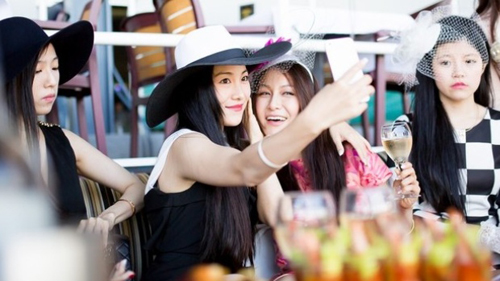By Vivian Nguyen
Northwest Asian Weekly

HBICtv’s “Ultra Rich Asian Girls of Vancouver”
I am seldom interested in reality television, but there’s something intriguing about reality shows that feature all-Asian <!–more–>casts. Whether it looks like a train wreck or a show with actual value, there’s a surefire guarantee I’ll watch it. So what’s the latest reality show I’ve been following? The reality web series “HBICtv: Ultra Rich Asian Girls of Vancouver” (“HBICtv”).
“HBICtv” follows four affluent Chinese Canadian girls who chase their career aspirations while flaunting their obscene wealth and privilege in your face. The show is currently in the middle of its first season with five episodes aired as of this date. Show highlights thus far include the girls eating oysters in high-end, elite restaurants in Vancouver to shopping for haute couture in Milan.
Cast members speak Mandarin and English during the talking head interviews and filmed scenes, which is a departure from other reality shows that feature Asians in North America. “HBICtv” is primarily aimed at viewers in China, according to several Canadian outlets that have covered the web reality show.
Mixing reality television with “cultural drama”
For Kevin Li, the show’s producer and creator, there is a bigger picture involved with the launch of “HBICtv.” Li hopes to balance the tone and topics of the web series by reintroducing his previously filmed 2012 documentary that looks at the humble roots of Chinese Canadians in Vancouver.
His documentary, which was recently renamed to “Ultra Hard Working and Not Rich Asians of Vancouver,” to contrast with the premise and title of “HBICtv,” explores Chinese immigrant history and culture, which has long played a big role in Li’s professional and personal life. The documentary was made available in English, Chinese, and Mandarin. Li hopes that “HBICtv” will draw more attention to the documentary, which currently has just over 3,000 views online.
Li, who has 17 years of experience in news broadcasting, originally conceived of “HBICtv” when he started noticing a flood of wealthy immigrants arriving to Vancouver from Mainland China and Taiwan. He was particularly curious about young Asians loaded with unimaginable wealth.
In an interview with the Canadian news outlet The Early Edition, Li says he was motivated to create “HBICtv” because of a past video project he produced, which featured a few Chinese girls hanging out with their friends and generally having fun. The video garnered 60,000 hits in 24 hours.
“What [this video project] tells me as a producer is that people would rather watch HBIC TV than educational documentaries,” said Li. “So I thought, why can’t I hide something educational in this programming?”
Unlike other popular North American reality shows with all-female main casts, such as “Keeping up with the Kardashians” or the “Real Housewives” franchise, “HBICtv” focuses more on what Li refers to as “cultural drama.”
That is, charged social interactions and drama influenced by cultural understandings.
One “HBICtv” episode follows the girls on a historical tour of Victoria B.C.’s Chinatown, a site with meaningful roots to the Chinese Canadian immigration experience. In this episode, the girls take jabs at one another for cultural reasons, such as over praying (or not praying enough) to the Buddha during a temple visit, or for specific things asked for during fortune-telling.
These jabs, or the specific topics the girls touch on to criticize one another, are what Li refers to as “cultural drama.”
This is what Li is hoping will resonate with viewers — presenting cultural insight and experiences through the lens of entertainment.

Repositioning Asian women in Canadian media
The response to “HBICtv” has drawn its share of online criticism both in Canada and overseas in Asia, with many claiming that the series showers too much attention on the rich, and does not provide an accurate representation of Chinese Canadian women.
Rather than making this a commentary about our society’s inability to ingest education without some form of distraction, or criticizing the show’s ostentatious show of wealth, I’m focusing more on what Li wants to accomplish with the show, in addition to how “HBICtv” is repositioning Asian women living in North America.
Like other web reality series featuring Asians in a non-stereotypical light — such as the YouTube reality series “K-TOWN,” which followed club-loving, partying Asian Americans in Southern California — “HBICtv” aims to reposition a minority group in the public eye, and reintroduce them in ways that the media is not accustomed to seeing.
In this case, “HBICtv” allow viewers to see these Asian women beyond the media stereotypes of being submissive, quiet, or nerdy. Yes, these women are entitled or self-absorbed at times, and there are plenty of eye-rolling moments on the show. But these women are also confident, powerful, and assertive in their own ways, and there is significance to be had in introducing these Asian Canadian women in a different light. Like its web reality show predecessors, “HBICtv” makes this minority demographic more fully-fleshed in the media. And there is social value to that.
The important thing to remember is that this show and its cast do not aim to represent the entire Chinese Canadian experience. Much like reality shows before it, and the shows that will surely come after, “HBICtv” offers a small, magnified depiction of a much larger minority group and demographic full of people with just as many flaws and rich experiences. (end)
Vivian Nguyen can be reached at info@nwasianweekly.com.




Garbage like this why aliens should just colonize and exterminate us. These people make me ashamed to be a homo-sapien.